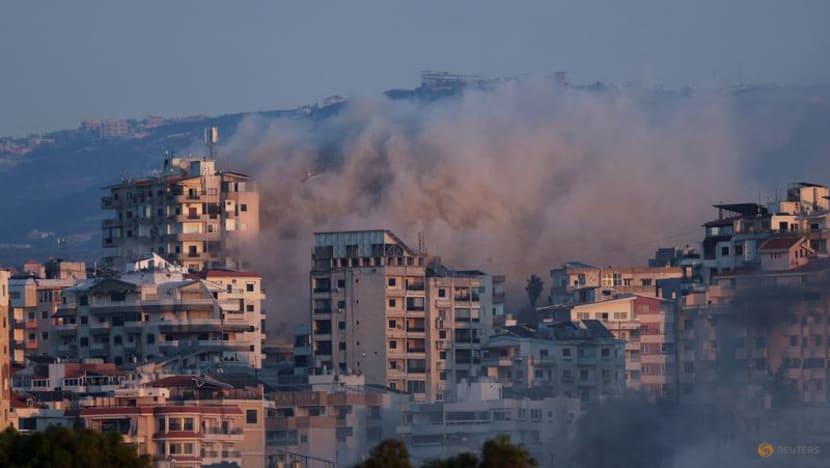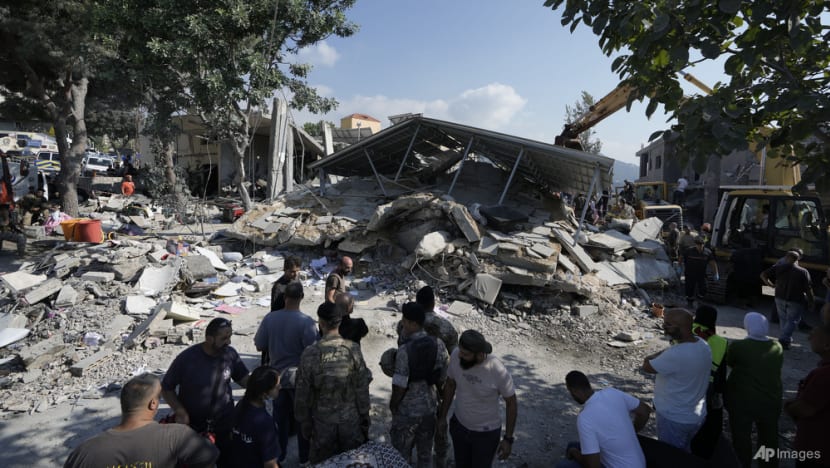Israel says a ground assault on Lebanon is possible; diplomats scramble to avert war

Smoke billows over southern Lebanon following an Israeli strike, amid ongoing cross-border hostilities between Hezbollah and Israeli forces, as seen from Tyre, Lebanon September 25, 2024. REUTERS/Amr Abdallah Dalsh
BEIRUT: Israel's military chief told troops on Wednesday (Sep 25) that its heavy air strikes on Lebanon were preparing the way for a possible ground operation by Israeli forces against Hezbollah militants while a flurry of diplomacy sought to prevent all-out war.
The US and France were trying to hammer out an interim accord to halt hostilities with a view to opening broader talks that would include efforts to achieve a long-sought ceasefire in Gaza, Cyprus' President Nikos Christodoulides told Reuters on the sidelines of the UN General Assembly in New York.
US President Joe Biden told ABC television that all-out war was possible, but added: "We're still in play to have a settlement that can fundamentally change the whole region."

Israel shot down a missile that the Iranian-backed Hezbollah movement said it had aimed at the headquarters of the Mossad intelligence agency near Israel's biggest city, Tel Aviv.
Israeli officials said a heavy missile had headed towards civilian areas in Tel Aviv, not the Mossad HQ, before being shot down.
"This is both to prepare the ground for your possible entry and to continue degrading Hezbollah."
World leaders expressed concern that the conflict - running in parallel to Israel's war in Gaza against Hamas, a Palestinian militant movement backed by Iran - was escalating rapidly as the death toll in Lebanon rose and thousands fled their homes.
French President Emmanuel Macron said he was dispatching his foreign minister to Lebanon this week as part of efforts to stop war breaking out.
"There cannot be, must not be war in Lebanon," he said in a speech on Wednesday at the annual meeting of the 193-member United Nations.
Related:
CEASEFIRE PROPOSALS
Three Israeli sources said no significant progress had been made in the French-US effort as yet.
"Risk of escalation in the region is acute ... The best answer is diplomacy, and our coordinated efforts are vital to preventing further escalation," Blinken said at a meeting with Gulf Arab state officials and ministers in New York.
Israeli airstrikes this week have targeted Hezbollah leaders and hit hundreds of sites deep inside Lebanon, where hundreds of thousands have fled the border region, while the group has fired barrages of rockets into Israel.
In a video message that did not comment on diplomatic efforts to secure a ceasefire, Israeli Prime Minister Benjamin Netanyahu said Hezbollah was being hit harder than it could ever have imagined.
Lebanese hospitals have filled with the wounded since Monday, when Israeli bombing killed more than 550 people in Lebanon's deadliest day since its civil war ended in 1990.
Hezbollah said it had aimed the missile at Mossad headquarters "in support of our steadfast Palestinian people in the Gaza Strip ... and in defence of Lebanon and its people".
It blamed the Mossad for the assassinations of its leaders.
It also accuses the intelligence agency of booby-trapping Hezbollah members' pagers and radios that exploded last week, killing 39 people and wounding nearly 3,000. Israel has neither confirmed nor denied involvement in those attacks.
The Islamic Resistance in Iraq, a pro-Iranian militant group, said it targeted Israel's southernmost city of Eilat with drones on Wednesday. There was no immediate comment from Israel.
ISRAEL EXPANDS STRIKES IN LEBANON
Israel has expanded the zones in Lebanon that it had been striking since Tuesday night, with attacks for the first time on the beach resort of Jiyyeh, just south of Beirut.
It also attacked Bint Jbeil, Tebnin and Ain Qana in the south, the village of Joun in the southern Chouf district near Sidon, and Maaysrah in the northern Keserwan district.
As many as half a million people may have been displaced in Lebanon, its foreign minister said. In Beirut, thousands of people displaced from southern Lebanon were sheltering in schools and other buildings.
More than 60 people were evacuated from the Christian town of Alma Chaab, along the border, following strikes overnight.
"At least two houses were completely destroyed but thankfully they were empty and we had no deaths," said Milad Eid, a resident.


















